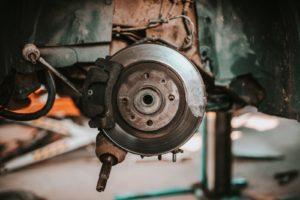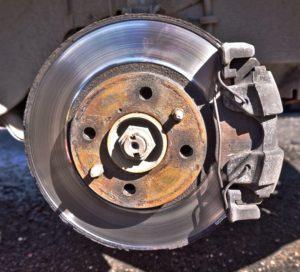Contents
Explanation of Brake Lock-Up

Common Causes of Front Disc Brake Lock-Up
Brake Fluid Issues
One common cause of brake lock-up is problems with the brake fluid, which plays a crucial role in transmitting the force from the brake pedal to the calipers. If the brake fluid is contaminated, for instance by water or air bubbles, it can lead to inconsistent pressure on the brake pads, potentially causing them to grip the rotor excessively and result in lock-up.Caliper Problems
The caliper’s role is to squeeze the brake pads onto the rotor to slow or stop the vehicle. If a caliper gets stuck due to dirt, rust, or other forms of damage, it may not release properly when the emergency brake or pedal is released, causing continuous pressure on the rotor and leading to brake lock-up.Brake Hose Issues
Brake hoses carry the brake fluid from the brake lines to the calipers. If a brake hose is damaged or clogged, it can restrict the flow of brake fluid, creating imbalanced pressure that can lead to a brake lock-up.Problems with Brake Pads and Rotors
Over time, brake pads and rotors can wear unevenly, get damaged, or overheat due to excessive braking. These issues can cause the brake pads to engage the rotor unevenly or excessively, potentially causing the front brakes themselves to lock up. Regular inspection and maintenance of these components are key to preventing such issues.Detailed Look at Each Cause
Brake Fluid Issues and Lock-Up
Brake fluid serves as the medium for pressure transmission in a braking system. Any contamination or degradation of the brake fluid can result in the improper transmission of hydraulic pressure. This can cause a condition where the brakes are not released fully when the brake pedal is released, or the brakes are applied excessively even with slight pedal pressure, leading to a lock-up situation. Common contaminants for brake issues include water, which can lead to vapor lock due to heat, or air, which can cause sponginess and inconsistent braking response.Caliper Problems and Lock-Up
The brake caliper acts like a clamp to keep traction and apply pressure from the brake pads onto the rotor. If a caliper is damaged or jammed due to rust, dirt, or lack of lubrication, it may not retract when the brake pedal is released. This leads to continuous pressure being applied on the brake pads against the rotor, resulting in an overheating condition and potential lock-up of the wheel.Role of Brake Hoses in Lock-Up
Brake hoses are essential for transmitting brake fluid under pressure from the master cylinder to the brake calipers. A damaged, worn out or clogged brake hose can hinder this fluid transmission, leading to a delay in brake release or uneven pressure distribution on drum brakes. This could create a situation where one or more wheels are braked excessively, leading to a lock-up.Brake Pad and Rotor Problems and Lock-Up
Brake pads and rotors are the primary contact points for friction in a vehicle’s brake system itself. Over time, they can wear unevenly, become glazed due to excessive heat, or get contaminated with brake fluid or oil. These issues can lead to a decrease in frictional coefficient or an uneven application of braking force, resulting in unpredictable braking response and potential lock-up.Solutions and Preventative Measures for Brake Lock-Up
 Addressing brake lock-ups often requires professional assistance due to the complexity and importance of the brake system. If brake fluid is the issue, a mechanic can flush the system and replace the fluid. Caliper problems may necessitate a caliper rebuild or replacement. Damaged brake hoses should be replaced, and issues with brake pads or rotors may be resolved with resurfacing or replacement. Regular professional inspections can also help to prevent issues before they become serious, ensuring your car’s braking system always remains safe and effective.
For those with mechanical knowledge and skill, some maintenance tasks can be done at home to prevent brake lock-up. Regularly checking and replacing brake fluid can help prevent contamination issues. Keeping an eye on brake pad wear and replacing them when necessary can prevent problems with brake pads, brake calipers, and rotors. Regularly cleaning brake components can help prevent dust and grime build-up that can interfere with caliper movement. However, always remember that working on your vehicle’s braking system can be risky if you’re not fully confident in what you’re doing, and some tasks should be left to professionals.
Addressing brake lock-ups often requires professional assistance due to the complexity and importance of the brake system. If brake fluid is the issue, a mechanic can flush the system and replace the fluid. Caliper problems may necessitate a caliper rebuild or replacement. Damaged brake hoses should be replaced, and issues with brake pads or rotors may be resolved with resurfacing or replacement. Regular professional inspections can also help to prevent issues before they become serious, ensuring your car’s braking system always remains safe and effective.
For those with mechanical knowledge and skill, some maintenance tasks can be done at home to prevent brake lock-up. Regularly checking and replacing brake fluid can help prevent contamination issues. Keeping an eye on brake pad wear and replacing them when necessary can prevent problems with brake pads, brake calipers, and rotors. Regularly cleaning brake components can help prevent dust and grime build-up that can interfere with caliper movement. However, always remember that working on your vehicle’s braking system can be risky if you’re not fully confident in what you’re doing, and some tasks should be left to professionals.
